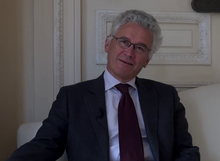Hervé Juvin
Hervé Juvin | |
|---|---|
 Juvin in 2013 | |
| Member of the European Parliament | |
Incumbent | |
| Assumed office 2 July 2019[1][2] | |
| Constituency | France |
| Member of the Regional Council of Pays de la Loire | |
Incumbent | |
| Assumed office 2 July 2021 | |
| Personal details | |
| Born | (1956-01-29) 29 January 1956 (age 68) Malestroit, France |
| Political party | National Rally (affiliated until 2022) |
| Website | hervejuvin |
Hervé Juvin (French pronunciation: [ɛʁve ʒyvɛ̃]; born 29 January 1956) is a French essayist and politician who was elected a Member of the European Parliament (MEP) on the National Rally (RN) list in 2019.[3] He sat with Identity and Democracy (ID) until 2022, when he was expelled after being sentenced for domestic abuse.[4]
He is author of a number of books, including The Coming of the Body, which examines the effects of longer human life spans on society and the individual.[5]
Environmental strategy
Hervé Juvin brought an environmental strategy to the National Rally party (Rassemblement National, RN). He subscribes to the Nouvelle Droite movement, a far-right French political movement often identified with neo-fascist tendencies. The European Parliament member's approach to ecology reflects the core principles of this ideology, which is why his environmental views are often associated with the ecofascist tendency.
He met with Marine Le Pen, leader of the RN at a conference in 2016 and started drafting the ideas about climate change that the party was going to embrace. The core is based on the belief in “cultural diversity and commitment to localism”[6].
Juvin believes that safeguarding national borders is essential not only for political reasons but also for ecological reasons, as it helps to preserve the distinctiveness of human cultures and societies. He believes in the “ecology of civilizations” rooted in nativism:
“It is the diversity of animal and plant species that ensures survival. If we reduce this diversity, we expose ourselves to the risk of the disappearance of the species. I don’t see why we wouldn’t have the same thoughts about the diversity of human species.”[7]
That is related to the conservation of the biodiversity in the country and then is translated into the rejection of immigration and globalization, making an analogy with “invasive species” that can threaten “local habitats”, the to-be preserved diversity, and national identity and heritage. The solution to this problem for him is to embrace national sovereignty:
"We will only respond to current ecological problems 'with states in full possession of their territory, which control the economy and their borders'[8].
Jauvin also stands for a conservative tendency regards to economy because he criticizes the free-trade agreements that represent the liberal and globalization currents. This relates to his view on ecology because this model leads to agglomerations of industrial and service parks, all of which are increasingly subject to regulatory capture, meaning they are being more and more influenced or controlled by the industries they are supposed to regulate [9].
Bibliography
- Le Renversement du monde: Politique de la crise (in French). Paris: Gallimard. 2010. p. 272. ISBN 978-2-07-013051-1.[10]
- La Grande Séparation: Pour une écologie des civilisations (in French). Paris: Gallimard. 2013. p. 400. ISBN 978-2-07-014287-3.[10]
- Le Mur de l'Ouest n'est pas tombé: Les idées qui ont pris le pouvoir et comment le reprendre (in French). Paris: Pierre-Guillaume de Roux. 2015. p. 288. ISBN 978-2-36371-128-1.[10]
- Le Gouvernement du désir (in French). Paris: Gallimard. 2016. p. 288. ISBN 978-2-07-269723-4.[10]
- France, le moment politique. Pour que la France vive !, Éditions du Rocher, 2018, 285 p.[10]
- Pourquoi combattre ?, directed by Pierre-Yves Rougeyron,[11] Éditions Perspectives Libres, Paris, Janvier 2019.
References
- ^ "Key dates ahead". European Parliament. 20 May 2017. Retrieved 28 May 2019.
- ^ "Key dates ahead". BBC News. 22 May 2017. Retrieved 28 May 2019.
- ^ CAZENAVE, Fabien (27 May 2019). "Parlement européen. Qui sont les 79 eurodéputés élus en France ?". Ouest-France.fr (in French). Retrieved 4 March 2020.
- ^ "Hervé Juvin, le «Monsieur écologie» de Marine Le Pen, condamné pour violences conjugales". Libération.fr (in French). 7 November 2022.
- ^ "Book review: The Coming of the Body by Hervé Juvin". newhumanist.org.uk. Retrieved 4 March 2020.
- ^ Bivar, Venus (2022). The Patriot Ecology of the French Far Right. Environmental History. pp. 618–624. ISBN 1084-5453.
{{cite book}}:|access-date=requires|url=(help); Check|isbn=value: length (help) - ^ "Hervé Juvin : «Le malheur identitaire est plus grave que le malheur économique»". Figaro Vox. Retrieved 25 June 2024.
- ^ "Écologie : les contradictions de Marine Le Pen". Le Point. Retrieved 25 June 2024.
- ^ Bivar, Venus (2022). The Patriot Ecology of the French Far Right. Environmental History. pp. 618–624. ISBN 1084-5453.
{{cite book}}:|access-date=requires|url=(help); Check|isbn=value: length (help) - ^ a b c d e "Hervé Juvin". revue-elements.com (in French).
- ^ Leafted Pourquoi Combattre ? with authors, Cercle Aristote.
- v
- t
- e

 Current Members of the European Parliament from France (2019–2024)
Current Members of the European Parliament from France (2019–2024)- Catherine Amalric
- Stéphane Bijoux
- Gilles Boyer
- Sylvie Brunet
- Pascal Canfin
- Catherine Chabaud
- Ilana Cicurel
- Jérémy Decerle
- Laurence Despaux-Farreng
- Sandro Gozi
- Christophe Grudler
- Bernard Guetta
- Valérie Hayer
- Pierre Karleskind
- Fabienne Keller
- Guy Lavocat
- Nathalie Loiseau
- Max Orville
- Dominique Riquet
- Irène Tolleret
- Marie-Pierre Vedrenne
- Salima Yenbou
- Stéphanie Yon-Courtin
This article about a Member of the European Parliament from France is a stub. You can help Wikipedia by expanding it. |
- v
- t
- e
This article about a National Rally (France) politician is a stub. You can help Wikipedia by expanding it. |
- v
- t
- e











